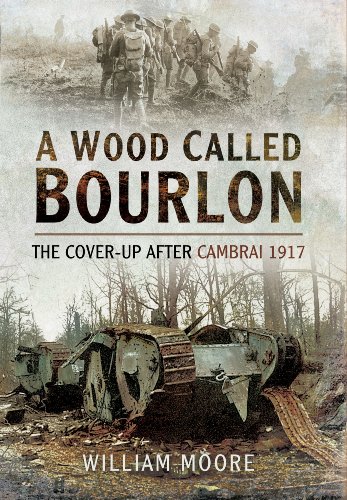Items related to A Wood Called Bourlon: The Cover-Up After Cambrai,...

"synopsis" may belong to another edition of this title.
"About this title" may belong to another edition of this title.
- PublisherPen & Sword Military
- Publication date2014
- ISBN 10 1473821266
- ISBN 13 9781473821262
- BindingPaperback
- Number of pages256
- Rating
Buy New
Learn more about this copy
Shipping:
£ 3.19
Within U.S.A.
Top Search Results from the AbeBooks Marketplace
A Wood Called Bourlon: The Cover-up after Cambrai, 1917
Book Description Paperback. Condition: New. *Brand new* Ships from USA. Seller Inventory # 9781473821262
A Wood Called Bourlon: The Cover-up after Cambrai, 1917 [Soft Cover ]
Book Description Soft Cover. Condition: new. Seller Inventory # 9781473821262
Wood Called Bourlon. The Cover-Up After Cambrai 1917
Book Description Condition: New. Seller Inventory # 242377
A Wood Called Bourlon: The Cover-up after Cambrai, 1917
Book Description Condition: New. Book is in NEW condition. Seller Inventory # 1473821266-2-1
A Wood Called Bourlon: The Cover-up after Cambrai, 1917
Book Description Condition: New. New! This book is in the same immaculate condition as when it was published. Seller Inventory # 353-1473821266-new
A Wood Called Bourlon: The Cover-up after Cambrai, 1917
Book Description Condition: New. . Seller Inventory # 52GZZZ00XS9S_ns
Wood Called Bourlon: The Cover-Up After Cambrai 1917 (Paperback)
Book Description Paperback. Condition: new. Paperback. After the great victory in the famous tank battle at Cambrai in 1917 the church bells, having been silent for three years, rang out joyously all over Britain. But within ten days triumph had turned to disaster. How did this happen and why? William Moore, a distinguished First World War historian, attempts to explain what went wrong. All the advantages gained were thrown away; thousands of British troops were captured and hundreds of guns were lost. Mr Moore has studied the evidence (much of it previously unpublished) contained in the inevitable enquiry that followed the disaster and he seeks to answer a number of questions. Was Field-Marshal Haig really as dour as he has been portrayed or was he a reckless gambler and was General Byng, whose troops and guns were captured, really a brilliant planner or a haughty aristocrat dedicated to proving that cavalry still had a place on the battlefield? Any why were they both obsessed with capturing Bourlon Ridge on which stood the sinister Bourlon Wood? A Highland Division, a Welsh Brigade, a Yorkshire Division (twice), the Guards, Ulstermen, Lancashiremen, Londoners and Midlanders - all were drawn into the maelstrom in an attempt to consolidate the Cambrai victory. They failed. It was left to the Canadians to carry the Bourlon position in one of the finest feats of arms of the Great War. The British were always reputed to take a perverse interest in their own military blunders. This strange episode is one that most people have been happy to forget. All those involved in high places sought to make excuses: some indulged in a profound exercise of duplicity implying that the soldiers alone were to blame. Mr Moore's book throws new light on a dark episode in British Military History. AUTHOR: William Moore is a Tynesider who spent many years as a Fleet Street journalist before joining the Ministry of Defence information service. He is an acknowledged specialist on the subject of the Great War. His book The Thin Yellow Line, dealing with executions for, among other things, 'cowardice' resulted in an amendment in the regulations protecting the 1914-1918 court martial files. 12 pages of b/w plates Details evidence contained in the inquiry that followed the disaster and seeks to answer a number of questions. Throws new light on this dark episode in British Military History. Shipping may be from multiple locations in the US or from the UK, depending on stock availability. Seller Inventory # 9781473821262
A Wood Called Bourlon: The Cover-up after Cambrai, 1917
Book Description Paperback. Condition: new. New Copy. Customer Service Guaranteed. Seller Inventory # think1473821266
A Wood Called Bourlon: The Cover-up after Cambrai, 1917
Book Description Condition: new. Seller Inventory # FrontCover1473821266
A Wood Called Bourlon: The Cover-up after Cambrai, 1917
Book Description Condition: New. Details evidence contained in the inquiry that followed the disaster and seeks to answer a number of questions. Throws new light on this dark episode in British Military History. Num Pages: 256 pages, 12 pages of b&W plates. BIC Classification: 1DDF; 3JJF; HBJD; HBLW; HBWN. Category: (G) General (US: Trade). Dimension: 157 x 236 x 22. Weight in Grams: 488. . 2014. Reissue. Paperback. . . . . Seller Inventory # V9781473821262

